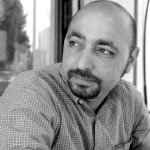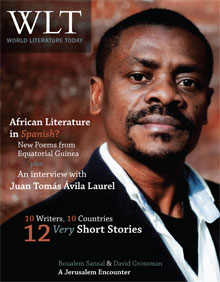History Will Not Be Made on This Couch
To the revolutionaries of Egypt who left
their couches and burnt their televisions
It’s raining again. Like the winters of my childhood. But my head has changed and is covered in scars. It’s not as light as it used to be.
It’s raining. A shower of the Imam’s heavy words falls on my head from the nearby minaret.
The last Friday in January isn’t a regular day in my room. Inside the TV, streets are flooding with colorful drops of people, stones, and barricades. Every now and then a barrage of bullets thunders, along with the lightning of Molotov cocktails.
The call for prayer gets louder along with my headache and I start diving and diving in search of the child/myself buried under layers and layers of betrayal.
“The people. Want. To bring down the regime.” The rain shouts as it becomes a stream that slides down the asphalt road and sinks down a drain right above my head. I feel cold and don’t dare to reach out from under the covers to change the station. My hand would freeze on the way, then rot and fall off.
Stones and spit and political analysts and speeding cars running over demonstrators and conspiring friends and groups of worshippers buying vegetables outside the nearby mosque their cars blocking the street and an official motorcade complete with sirens emptying the city and I am cold.
“Aaaaammeeeennnn.”
I will lose my hand.
“Aaaaammeeeennnn.”
I said: I will lose my hand.
“Aaaaammeeeennnn.”
Okay then.
“LEAVE already! Have some shame!” The laborer is shouting at the door of his embassy in Amman. A laborer who would rot in the dead pharaoh’s cellars if the tyrant is resurrected. There will be no demonstrators at the border officers’ kiosk, but he shouts all the same, and men in ties smile for the cameras as they search for someone to lead the chants. “Where are the chant leaders?” says one of the men in ties to the air, and then to his mobile phone: “Where are the banners?”
“Have some shame!”
“Where are the banners?”
“LEAVE already!”
I hold an umbrella with a broken handle, and there is no rain. The rain has stopped. In my living room sit a newscaster, political analysts, and the voice of the imam filled with spit. I open the umbrella, curl up underneath it, and find a paper, a pen, crumbs of speech and a sudden sound: trrrrrnnnn. A text message: “U never complain. Anyway I’ll leave u to finish what ure doing. I wish I was with u to hold u tight and tell u I have the world in my arms.”
Trrrrrnnnn. A text message: “The thugs. They r killing us.”
Trrrrrnnnn. A text message: “Comrade, I didn’t expect that from u. I’ll never speak to u again.”
Trrrrrnnnn. Trrrrrnnnn. Trrrrrnnnn. Stones and spit and political analysts and speeding cars running over demonstrators and conspiring friends and groups of worshippers buying vegetables outside the nearby mosque their cars blocking the street and an official motorcade complete with sirens emptying the city and I am cold.
How will I find that child/myself? How?
The television is on fire, and history isn’t being made on this couch.
The television is on fire, and the remote control doesn’t change history.
The television is on fire, and I am here, in front of it.
Let me die then.
Amen.
Translation from the Arabic
By Thoraya El-Rayyes
Editorial note: This story was published in Arabic in The Perception of Meaning (Beirut: Dar al-Adab, 2012).












